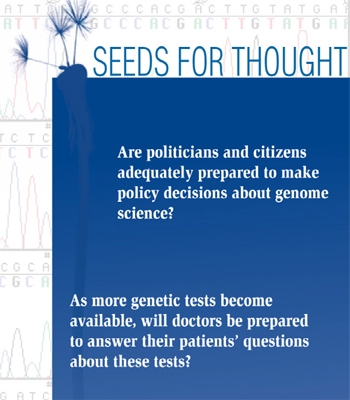Annes, J. P., Giovanni, M. A., & Murray, M. F. (2010). Risks of presymptomatic direct-to-consumer genetic testing. New England Journal of Medicine, 363(12), 100-101.
Clayton, E. W., (2003). Ethical, legal, and social implications of genomic medicine. New England Journal of Medicine, 349(6), 562-569.
Evans, J., Dale, D. C., & Fomous, C. (2010). Preparing for consumer-driven genomic age. The New England Journal of Medicine, 363(12), 1099-1103.
Fleck, L. M. (2010). Personalized medicine's ragged edge. Retrieved March 3, 2012 from: http://www.thehastingscenter.org/Publications/HCR/Detail.aspx?id=4854.
Francis, L. P. (2010). You are born with your genes: Justice and protection against discrimination in the use of genetic information. Mount Sinai Journal of Medicine, 77, 189-196.
Hawkins, A. K. (2010). Biobanks: Importance, implications and opportunities for genetic counselors. Journal of Genetic Counseling, 19, 423-429.
Khoury, M. J. Berg, A., Coates, R., Evans, J., Teutech, S. M., & Bradley, L. A. (2008, November/December). Health Affairs, 27(6), 1600-1611.
Lea, D. H., Skirton, H., Read, C. Y., & Williams, J. K. (2011). Implications for educating The next generation of nurses on genetics and genomics in the 21st century. Journal of Nursing Scholarship, 43(1), 3-12.
Lebel, R. (2005, November). Ethical issues in cancer genetics. Atlas of Genetics and Cytogenetics in Oncology and Haematology. Retrieved March 3, 2012 from: http://AtlasGeneticsOncology.org/Educ/EthicCancerGenet30029ES.html.
McKinnon R., & Anderson, C. (2011). Transforming pharmaceutical education to accelerate the acceptance and implementation of personalized medicine. American Journal of Pharmaceutical Education, 75(6), 1-2.
Ojha, R. P., & Thertullen, R. ( 2005). Health care policy issues as a result of the genetic revolution. Implications for public health. American Journal of Public Health, 95(3), 385-388.
Owens, T. A., Tabangin, M. E, Huether, C. A. Bowling, B. V., & Warren, N. S. (2009). High school biology/life science teachers' presentation of genetic counseling and health care career options in their classroom. Journal of Genetic Counseling, 18, 275-286.
Rochman, S. (2012). Clinical trials game-changer? Cancer Today, 12, 26-29.
Steele, F. L. (2009). Personalized Medicine: Something Old, Something New: So What's New? Personalized Medicine. 6(1), 1-5. Retrieved May 6, 2012 from: http://www.medscape.com/viewarticle/586267_5.
Vickers, A. J. (2006). Whose data set is it anyway? Sharing raw data from
randomized trials. Trials, 7(15). Retrieved April 12, 2012 from:
http://www.trialsjournal.com/content/7/1/15.
Wolinsky, H. (2011). Genomes, race and health. EMBO Reports, 12, 107-109. |
|




